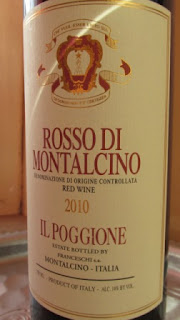A pity it was corked, that is. There is no mistaking the aroma of damp, mildewed cardboard, or a flooded basement after a summer storm.
The wine would have been lovely I am sure, if very acidic, which is to say very Italian -- meant to wash down food, not stand alone as a cocktail. Rosso di Montalcino, or "red of [the town of] Montalcino," is a DOC (Denominazione di Origine Controllata) of Tuscany. The grape used is brunello, a clone of sangiovese. A step above our plain Rosso is Brunello di Montalcino DOCG (Denominazione di Origine Controllata e Garantita) -- same grape, same land, stricter standards. Capital-B Brunellos are made from the best of the brunello harvest and are aged four years before bottling instead of one. The result is a famously "brawny," tannic, complex wine, and expensive, too, easily retailing for $60. Even then you are advised to stash it in your cellar for years so that it may soften and ripen. Our Rosso starts out fresher tasting and readier to drink, and costs in the $20 range.
As to the cork problem. It happens, in about 5 percent of wines, experts tell us. When we smell damp basement we are smelling a chemical compound called 2,4,6-Trichloroanisole or TCA, which the human nose "can detect at levels as low as 30 parts per trillion" (Ron and Sharon Tyler Herbst, The New Wine Lover's Companion). Karen MacNeil in The Wine Bible says that TCA comes from an interaction of certain bacteria with chemicals in the cork-cleaning process. The problem doesn't go away -- or does it? A few years ago the great Harold McGee, in his New York Times column the Curious Cook, passed on a tip from a scientist friend. Slosh your corked wine into a bowl with a piece of ordinary plastic wrap, the friend said, and damp basement will go away. TCA is "chemically similar to polyethylene and sticks to the plastic." Full disclosure: I tried this once with another wine, but in my opinion it didn't work.
For more on Franceschi's brunellos and rossos, see the February 20, 2013 article at NJ.com -- "Restrained winemaking elevates il Poggione's brunellos."




No comments:
Post a Comment
Thanks for stopping by ...